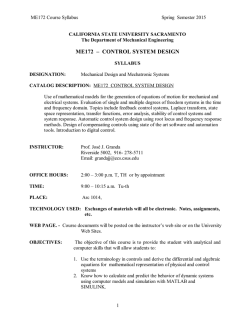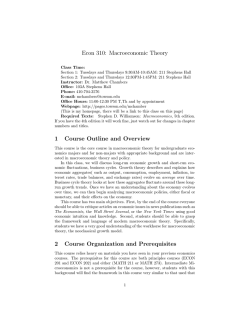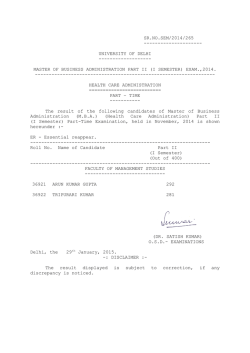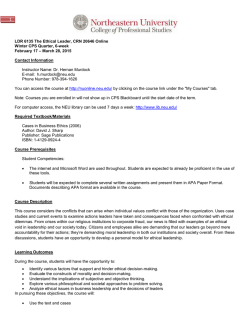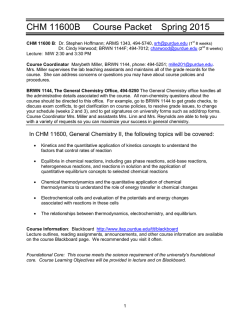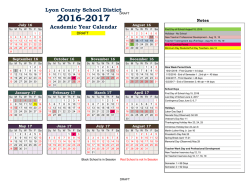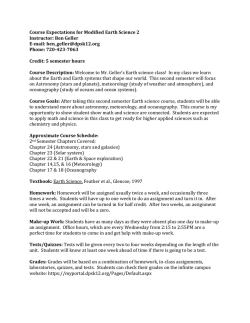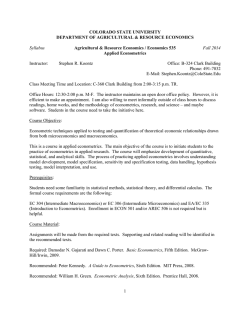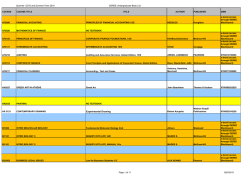
NATURAL RESOURCE AND
NATURAL RESOURCE AND ENVIRONMENTAL ECONOMICS AGEC/FNR 406 Fall 2012 MWF 2:30-3:20PM in KRAN G016 Teaching Assistant: Tanner McCarty TA Office hour: Wednesdays 1-2PM, KRAN 580 Professor Gramig Office: Krannert 564 Office Hrs: Thurs 1-3PM (or by appt) Phone: 765-494-4324 e: [email protected] OVERVIEW Economic activity and the natural environment are inseparable. Private decisions and public policies entail tradeoffs between economic and environmental outcomes. Natural resource and environmental economics provides a means to assist us in understanding the causes of environmental problems and developing solutions consistent with society's economic and environmental objectives. This course provides an introduction to natural resource and environmental economics. Lectures, homework assignments, and in-class discussion/exercises are used to provide insights into economic aspects of a wide range of environmental issues including energy, climate change, pollution control, fisheries management, and other links between the economy and the environment. Objectives: • Learn how to examine environmental and natural resource issues from an economic perspective • Apply basic tools of economic analysis to evaluate public policies or make private decisions COURSE MATERIALS Much of the course material is available online, including the syllabus, class schedule, slides presented in class, and homework assignments. The required text that will be used extensively in the course is: Tietenberg and Lewis. Environmental Economics and Policy, 6th edition. Reading, MA: Addison-Wesley, 2010. ISBN-10: 0-321-59949-7. An online or electronic copy of the text is available from the publisher. The previous edition of the text may be acceptable, but it is the student’s responsibility to verify if there is missing or updated content that needs to be retrieved from the 6th edition course reserve or another student. Two copies of the course text are on 2-hour reserve in the Parrish Library of Management and Economics (formerly “MEL,” second floor of KRAN). COURSE WEBSITE The course website is accessible through the Purdue University Blackboard Vista system at: http://www.itap.purdue.edu/tlt/blackboard/index.cfm. All PowerPoint slides, assignments, schedule updates/changes, and announcements will be posted to the Blackboard site. Important: I will send messages to the class using the Blackboard email utility throughout the semester and in the event of any schedule change. Please make sure that your personal Blackboard settings are configured so that you will receive any messages sent in this manner. You must set Blackboard to forward messages to your preferred email account; it will not do this by default. Please make sure that you check Blackboard and/or your linked email account at least daily throughout the semester for any updates or changes. PREREQUISITE The pre-requisite for this class is AGEC 203 or AGEC 204 or EC 251. You must have completed the prerequisite or an equivalent “principles of microeconomics” course to take the class. ATTENDANCE & ETIQUETTE Students are expected to attend every class. Course notes and readings available online are not a substitute for attending class and participating in computer or web-based exercises that are part of the course. AGEC/FNR 406 Fall 2012 Absolutely no use of mobile phones is allowed during class time and all phones should be silenced completely when entering the classroom. This means no texting, emailing, playing games, listening to music, checking Facebook, or taking/placing calls during class. This is a distraction to others around you and there is no reason to be in class if you are not going to pay attention. If you know you will need to leave early on a given day, please sit in the front row as near to the classroom exit as possible so that you do not disturb others if you must leave before class ends. Similarly, if you arrive late take a seat as close as possible to the entrance to the room so that you are not walking across the entire classroom once class is already underway. ADDITIONAL HELP & RESOURCES I encourage students to come see me individually or in small groups during office hours (or by appointment) if they have questions about the class material, readings, homework assignments, or other topics relevant to the course. I want you all to learn the course material and be successful in this class and beyond, and I will work with you to help you succeed. If you don’t understand something or find yourself falling behind in the class, I cannot help you if you do not take the initiative to come meet with me. In this class, as in life, you bear the lion’s share of the responsibility for your own success. This is not an easy course, but I will give you the resources you need to be successful. Those resources are your lecture notes (PowerPoint slides and handwritten notes that cover problems from the chalkboard), textbook, and homework assignments. You will need to use all of these course materials to be at the top of the grade distribution at the end of the semester. GRADING POLICY (All dates are tentative, see dynamic online schedule for current dates/deadlines) The final course grade is computed based on the total points earned from: 1) Quizzes, in-class (details below) 14% 2) Homework assignments (4 of equal weight): Sep. 17, Oct. 5, Nov. 12, Nov. 26 29% 3) Exams (2 of equal weight): Exam 1 on Oct. 12, Exam 2 on Nov. 30 during class time 57% 4) Cumulative Final Exam (Optional) replaces lowest exam score in final grade calculation: TBD Final grades will be assigned according to the following +/- scale: Grade GPA Value A+ 4.0 A 4.0 A3.7 B+ 3.3 B 3.0 B2.7 C+ 2.3 2.0 C NOTE: 75.0=lowest passing score for the Pass/No Pass grade option C1.7 D+ 1.3 D 1.0 D0.7 F 0.0 2 Percentage 97.0-100 93.0-96.9 90.0-92.9 87.0-89.9 83.0-86.9 80.0-82.9 77.0-79.9 73.0–76.9 70.0–72.9 67.0–69.9 63.0–66.9 60.0–62.9 < 60.0 AGEC/FNR 406 Fall 2012 HOMEWORKS Four (4) homework assignments will be assigned during the semester. Each will contribute equally to your final grade in the course based on the Grading Policy stated above. The purpose of the homework assignments is to help you master your understanding of key concepts and learn how to apply the analytical tools that are used in environmental and natural resource economics. You may discuss homework assignments with your classmates, but you must write-up and submit your own answers for each problem set. These assignments will be posted on the course webpage (on Blackboard Vista). Tentative due dates are indicated above and updated due dates will be posted on the online course schedule. Specific instructions will be included with each individual assignment. Late homework will not be accepted. Start assignments early so that computer problems or Blackboard Vista service outages on the night or weekend before the due date do not prevent you from completing the assignment on time. By not waiting until the last minute, you will also have time to seek help outside of class if you are having trouble with the homework questions. Missing class on the due date of an assignment is not an excuse, even if you are ill. All assignments must be submitted online using the assignment dropbox feature inside of Blackboard Vista by class time (2:30PM) on the due date, unless otherwise stated. Homework assignments should be prepared with the same care and attention to detail that you would use when writing a professional memorandum to your employer. Answers should be written in complete and comprehensible sentences. The use of word processing and spreadsheet software is strongly encouraged. When your responses require mathematical calculations to be made, you must show your work to receive full credit. When written responses to homework questions are based on calculations, your responses should correspond to the mathematical calculations you provide. QUIZZES Short, unannounced quizzes will be given in class twelve (12) times during the semester. I will drop the two lowest quiz grades received when calculating your final grade. Each quiz will be worth 10 points and will contribute equally to your final grade based on the Grading Policy contained in this syllabus. These quizzes are given to: (1) Encourage students to keep up with the course material: (2) Provide students feedback regarding mastery of key concepts. (3) Provide students practice for exams. Quizzes cannot be taken early or late, and missed quizzes cannot be made up for any reason. The reason the two lowest grades will be dropped is to help make up for any absences (excused or otherwise) on quiz days throughout the semester. If you anticipate missing a quiz, you should plan for this to be one of the quizzes you drop. If you have more than two documented excusable absences (including official university activities) you will need to meet with me about this highly unusual circumstance. EXAMS Two (2) exams will be given during the semester, as indicated on the course schedule posted on Blackboard Vista. The first exam will be given on the Friday after October Break. The second exam will be given during the last class period before Dead Week. Each exam will contribute equally to your final grade based on the Grading Policy stated above. FORMAT: Exams are designed to test your understanding of concepts and application of the tools for economic analysis introduced in the class. Exams include multiple choice and short answer questions that emphasize application of core concepts and problem solving that reflects the kinds of questions on the homework assignments and quizzes. 3 AGEC/FNR 406 Fall 2012 An optional final exam will be given during the scheduled final exam period and will be cumulative. If a student takes the optional final, the score received on the cumulative final will replace their lowest score on Exams 1 and 2 when the final grade is calculated. SPECIAL ACCOMODATIONS If you have a disability that requires special academic accommodation, please make an appointment to speak with me within the first three weeks of the semester. It is important that we talk about this at the beginning of the semester. Please note that university policy requires all students with disabilities to be registered with the Disability Resource Center (http://www.purdue.edu/drc/) in the Office of the Dean of Students (http://www.purdue.edu/odos/) before classroom accommodations can be provided. Please make an appointment with me soon to discuss and address your needs. ACADEMIC DISHONESTY University policy on academic misconduct is clear - academic dishonesty in any form is strictly prohibited. Instances of academic dishonesty will be referred to the Office of the Dean of Students for disciplinary action (http://www.purdue.edu/ODOS/osrr/integrity.htm). Penalties are severe and will mean failure on the exam, quiz, or homework in question, and may mean failure in the course and/or expulsion from the University. The risks associated with academic dishonesty far outweigh the benefits. Academic dishonesty includes citing someone else's work as your own, using unauthorized "crib sheets" during exams, or sharing your answers with someone else. If you are unsure whether an action you are considering constitutes academic dishonesty, seek clarification from your instructor. Other information regarding your rights and responsibilities as a student are contained in the Purdue University Student Conduct Code (http://www.purdue.edu/ODOS/osrr/conductcode.htm). CAMPUS EMERGENCY OR OTHER UNFORSEEN CIRCUMSTANCE In the event of a major campus emergency, course requirements, deadlines and grading percentages are subject to changes that may be necessitated by a revised semester calendar or other circumstances beyond the instructor’s control. There are several ways to get information about such changes in this course in the event of an emergency: check the Blackboard Vista webpage for AGEC/FNR 406; check for university-wide announcements online at www.purdue.edu; call my office at 765-494-4324 or send me an email ([email protected]). 4 AGEC/FNR 406 Fall 2012 TENTATIVE CLASS SCHEDULE A detailed daily schedule with any necessary adjustment of dates made on an ongoing basis throughout the semester can be found in the online course schedule on Blackboard. The online schedule will always supersede the tentative schedule in this course syllabus, and will reflect when weekly journals are due. August 22 August 24-29 September 5-12 September 14-21 September 24-28 October 1-5 October 8 October 10 October 12 October 22-26 October 29-31 November 9-7 November 9-12 November 14-26 November 28 December 30 December 5 December 7 Chapter 1: Visions of the Future Chapter 2: Valuing the Environment: Concepts Chapter 3: Valuing the Environment: Methods Chapter 4: Property Rights, Externalities, and Environmental Problems Chapter 5: Sustainable Development Chapter 7: Natural Resource Economics (Overview) Fall Break Exam Review session: Student questions and professor’s answers Exam 1 (in-class) Chapter 8: Energy Chapter 13: Common-Pool Resources: Fisheries and Other Species Chapter 14: Environmental Economics (Pollution Control) Chapter 16: Climate Change Chapter 18: Water Pollution Exam 2 Review session: Student questions and professor’s answers Exam 2 (in-class) Course wrap-up (Optional) Cumulative Final review: Student questions & professor’s answers December TBD Final exam during scheduled final exam day/time of Finals Week 5
© Copyright 2026
